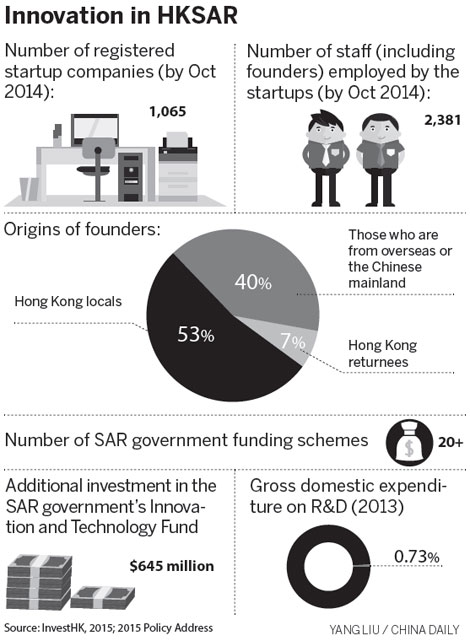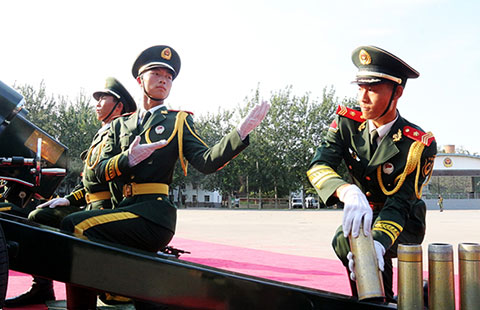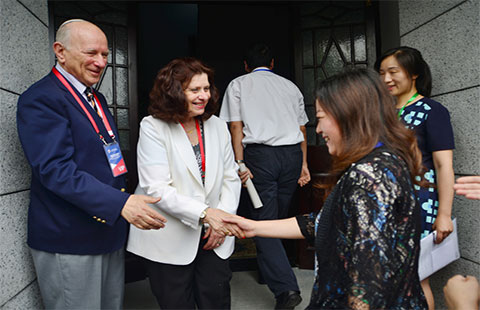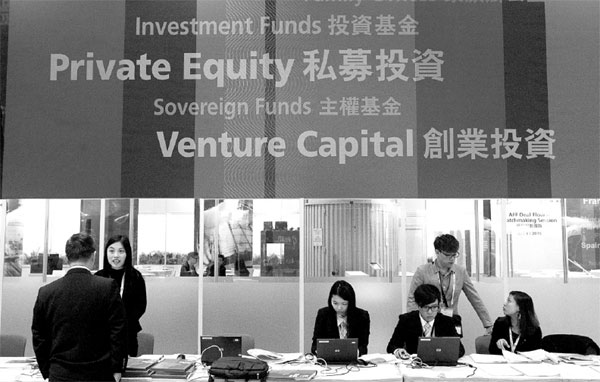Creating an ecosystem for entrepreneurs
Updated: 2015-08-31 08:00
By Deng Yanzi in Hong Kong(China Daily USA)
|
||||||||
Hong Kong SAR government looks to foster innovation with its dedicated arm
Despite the golden sunshine and the allure of world-renowned research institutes, Winnie Lun did not want to stay on in California. After spending 30 years in the United States, Lun decided to return to Hong Kong, her home city, lured by the abundant government grants that would help fast track the growth of her biotech company.
Lun is the founder of eNano Health, which has developed a non-invasive, affordable method of glucose testing using saliva. Schemes under the government's Innovation and Technology Fund have provided eNano Health with over $600,000 for research and development purposes. Such funding mechanisms are "essential for biotech companies" as research and clinical trials often incur huge costs, Lun said.
|
Investment consultants provide advice to startups in an office in Wan Chai district, Hong Kong. Provided to China Daily |
Her company is currently an incubator at the Hong Kong Science Park - a technology cluster set up by the government 14 years ago.
As an ongoing effort of the government to support innovation in Hong Kong, Chief Executive Leung Chun-ying has been touting his plan of setting up an Innovation and Technology Bureau for three years, and lately at the opening of a 3-D printing gallery.
"The Hong Kong government will continue to push forward to set up the ITB, which will be tasked to coordinate the entire technology team of Hong Kong, so as to support the development of innovation and technology industry," Leung said.
Though Leung had proposed the establishment of ITB in his election manifesto in 2012, the plan was put on hold due to filibustering in the Legislative Council.
However, as Leung reiterated the government's ongoing support for innovation and technology, a wave of controversy was building after an earlier police raid on Uber's Hong Kong office.
The ride-hailing app was accused of operating without a license and insurance, both of which are required for traditional taxi services. Industry sources have expressed apprehensions that the dated regulations are a hindrance to fostering innovation in the city.
Sam Gellman, general manager of Uber Hong Kong, has called for "smart regulations" for innovative businesses in the city.
"A smart city must have smart regulations fit for a digital age, and we look forward to working closely with regulators towards developing a regulatory approach that enables more choice and innovation while putting the safety and interests of riders and drivers first," Gellman told the South China Morning Post after the raid.
As some startups struggle to move forward, various players in the ecosystem hold different expectations regarding the role the government should play in driving innovation.
In early August, Witman Hung Wai-man, president of Hong Kong's Internet Professionals Association, urged the government to "stay out of the way" of the innovative companies.
The primary role of the government is to create the infrastructure and environment to make things easier for entrepreneurs, instead of building roadblocks, Hung told an audience at the Global Youth Entrepreneurs Forum in Hong Kong.
"If you (the government) can't help, at least stay out of the way."
Some sources are cautious about the risks if the government gets too involved in the ecosystem, especially with direct funding to startups.
The government lacks the expertise to identify which company they should invest in and which they should not, and therefore should leave those decisions to the market and the relevant industries, Rono Kwong, founder of Best Video Ltd and chairman of Hong Kong General Chamber of Young Entrepreneurs, told China Daily.
The government now offers over 20 funding schemes to entrepreneurs, after a cash infusion of HK$5 billion ($645 million) into the Innovation and Technology Fund earlier this year.
But startups shouldn't pin all their hopes on the government in the first place, say many local entrepreneurs.
"To be an entrepreneur is your own choice," Kwong said.
"You should not rely on any city policies or support from the government. All those things (are) an extra bonus for you. You have to focus on what you are doing."
Rex Sham, co-founder of Insight Robotics, said he believes that funding is a business decision and the government should not be the priority for financial support.
A healthy business always relies on its own business model, Sham said.
His company that makes wildfire detection robots raised $2 million from a local angel investor and has now closed the first round of funding with another $2 million.
Some innovators who have benefited from the government funding also agree that funding should not be the top priority for the authorities.
Wallace Wong, founder and technical director of Well Being Digital, received grants for patenting his accurate heart rate measurement technology when he started his company in 2012.
He said that the government funding is sufficient, and would like to see more attention paid to attracting foreign investors, to offset conservatism and lack of foresight by the local investors.
That task rests squarely on Invest Hong Kong, or InvestHK, the government's foreign direct investment promotion agency.
InvestHK is seeking to attract investors from overseas who are keen on investing in startups and also to assist local investors who lack the experience in investing in innovative firms, Charles Ng, associate director-general of InvestHK, told China Daily.
The government will function as a facilitator and bring people together into the ecosystem, as innovation and entrepreneurship emerge and grow in a bottom-up approach in the local startup scene, Ng said.
However, experts expect more thorough planning and coordination of government resources and initiatives.
Allen Ma, chief executive of Hong Kong Science and Technology Parks Corporation, believes that a critical role of government in driving the development of any industry was policy setting.
"To better meet the needs of the dynamic information technology industry, it would be better for the government to map out a long-term development blueprint and formulate supportive policies to attract more investors and talents to the industry," Ma said.
iris@chinadailyhk.com

(China Daily USA 08/31/2015 page16)

 Bolt 'somersaults' after cameraman takes him down
Bolt 'somersaults' after cameraman takes him down
 A peek into daily drill of ceremonial artillery unit
A peek into daily drill of ceremonial artillery unit
 93-year-old's murals save Taiwan's 'Rainbow Village'
93-year-old's murals save Taiwan's 'Rainbow Village'
 Top 8 novel career choices in China
Top 8 novel career choices in China
 Hairdos steal the limelight at the Beijing World Championships
Hairdos steal the limelight at the Beijing World Championships
 Chorus of the PLA gears up for Sept 3 parade
Chorus of the PLA gears up for Sept 3 parade
 Iconic Jewish cafe 'White Horse Coffee' reopens for business
Iconic Jewish cafe 'White Horse Coffee' reopens for business
 Beijing int'l book fair opens new page
Beijing int'l book fair opens new page
Most Viewed
Editor's Picks

|

|

|

|

|

|
Today's Top News
China takes historical silver in men's 4x100m
Surviving panda cub at National Zoo is male
China eases rules for foreigners to buy property
Ministry denies troops sent to reinforce DPRK border
Stem cell donor offers ray of hope for US boy with leukemia
All creatures great and small help keep V-Day parade safe
China not the only reason global stock markets are in a tailspin
Market woes expected to delay Fed hike
US Weekly

|

|






